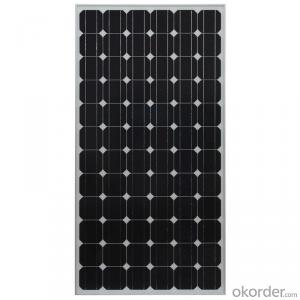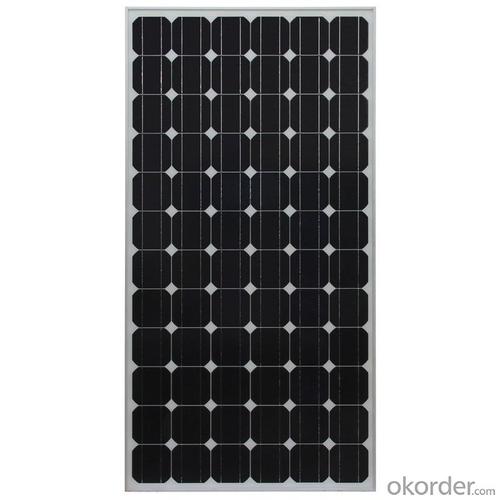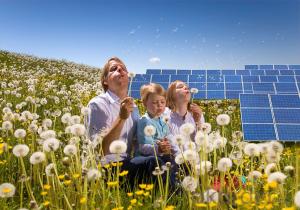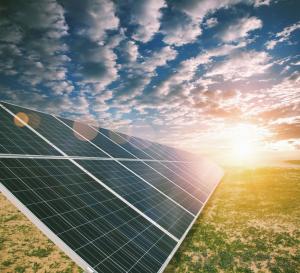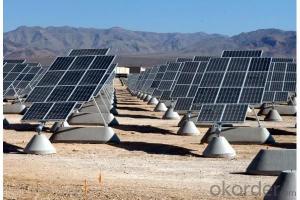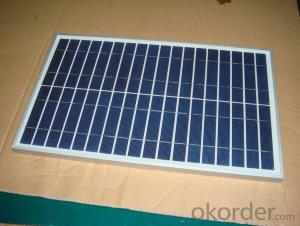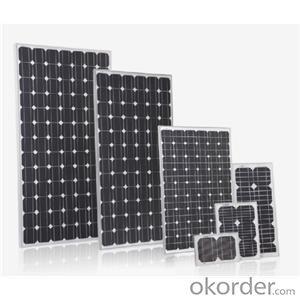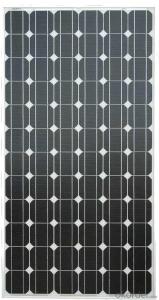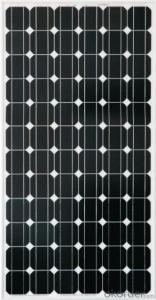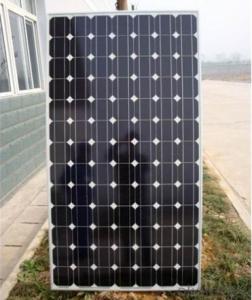Solar Panels Suffolk - High Efficiency Monocrystalline Solar Panel 200W Power
- Loading Port:
- Tianjin
- Payment Terms:
- TT OR LC
- Min Order Qty:
- 1000 watt
- Supply Capability:
- 10000000 watt/month
OKorder Service Pledge
OKorder Financial Service
You Might Also Like
Specification
Product Description
Key Specifications/Special Features
Maximum power: 200Wp
Maximum working voltage: 36.37V
Maximum working current: 5.51A
Open-circuit voltage: 43.89V
Short-circuit current: 5.90A
Cell efficiency: 18.20%
Cell number: 72 pieces (6 x 12mm)
Cell dimensions: 125 x 125mm
Solar panel dimensions: 1,580 x 808 x 35mm
Maximum system voltage: 1,000V
Operating temperature: -40 to 85®C
Surface maximum loading capacity: (surface can withstandmaximum pressure) 60m/s (200kg/m2)
Allowable hail load (hail stress testing) steel ball fall downfrom 1m height
Weight of each solar panel: 16kg
Connection box type: PV-JB001 (TUV)
Cable type: with TUV mark
Cable length: 900mm
Output power tolerance: ±3%
Frame material: aluminum
Standard test conditions (STC): 1,000W/m2 AM1.5,25°C
10 years warranty and 25 years for 80% of power
Fill factor: ≥72%
Loading:
20ft container: 351 pieces
40ft container: 756 pieces


Product Details
| Electrical Data | Module Size | Weight | Number of cells series | ||||
| Nominal Power | Max-Power | Max-Power | Open-Circuit | Short-Circuit | |||
| Voltage | Current | Voltage | Current | ||||
| Pmax | VMPP | IMPP | VOC | ISC | |||
| W | V | A | V | A | mm | Kg | pc |
| 10 | 17.2 | 0.58 | 21.6 | 1.31 | 340*254*17 | 1.2 | 36 |
| 20 | 17.2 | 1.16 | 21.6 | 1.93 | 340*460*25 | 1.8 | 36 |
| 30 | 17.2 | 1.74 | 21.6 | 2.57 | 350*670*30 | 3 | 36 |
| 40 | 17.2 | 2.32 | 21.6 | 3.23 | 450*670*30 | 3.5 | 36 |
| 50 | 17.2 | 2.91 | 21.6 | 3.86 | 550*670*30 | 4.5 | 36 |
| 60 | 17.2 | 3.49 | 21.6 | 3.86 | 603*670*30 | 5.3 | 36 |
| 70 | 17.2 | 4.07 | 21.6 | 4.51 | 758*670*30 | 6 | 36 |
| 80 | 17.2 | 4.65 | 21.6 | 5.17 | 758*670*30 | 6.5 | 36 |
| 90 | 17.2 | 5.23 | 21.6 | 5.81 | 935*670*30 | 6.7 | 36 |
| 100 | 17.2 | 5.8 | 21.6 | 6.46 | 935*670*30 | 6.7 | 36 |
| 110 | 17.2 | 6.4 | 21.6 | 7.08 | 1061*670*35 | 8 | 36 |
| 120 | 17.2 | 6.98 | 21.6 | 7.72 | 1161*670*35 | 8.6 | 36 |
| 130 | 17.2 | 7.56 | 21.6 | 8.4 | 1277*670*35 | 9.8 | 36 |
| 140 | 17.2 | 4 | 21.6 | 4.4 | 1480*670*35 | 10.9 | 36 |
| 150 | 17.2 | 4.17 | 21.6 | 4.58 | 1480*670*35 | 10.9 | 36 |
| 160 | 34.4 | 4.65 | 43.2 | 5.17 | 1480*670*35 | 10.9 | 72 |
| 170 | 34.4 | 4.94 | 43.2 | 5.49 | 1172*983*35 | 11.7 | 72 |
| 180 | 34.4 | 5.23 | 43.2 | 5.81 | 1172*983*35 | 11.7 | 72 |
| 190 | 34.4 | 5.52 | 43.2 | 6.14 | 1260*983*35 | 14.6 | 72 |
| 200 | 34.4 | 5.81 | 43.2 | 6.5 | 1260*983*35 | 14.6 | 72 |
| 210 | 34.4 | 6.1 | 43.2 | 6.85 | 1488*983*35 | 14.6 | 72 |
| 220 | 34.4 | 6.4 | 43.2 | 7.08 | 1488*983*35 | 15.2 | 72 |
- Q: where I can find solar panel the has 4.8 volts? Like those solar walkway light or something that has 4.8 volts solar panel.Do you think I can get it from home depot?
- How Solar Cells Work by Scott Aldous Inside This Article . Introduction to How Solar Cells Work 2. Photovoltaic Cells: Converting Photons to Electrons 3. How Silicon Makes a Solar Cell 4. Anatomy of a Solar Cell 5. Energy Loss in a Solar Cell 6. Solar-powering a House 7. Solving Solar-power Issues 8. Solar-power Pros and Cons 9. Lots More Information 0. See all Physical Science articles You've probably seen calculators that have solar cells -- calculators that never need batteries, and in some cases don't even have an off button. As long as you have enough light, they seem to work forever. You may have seen larger solar panels -- on emergency road signs or call boxes, on buoys, even in parking lots to power lights. Although these larger panels aren't as common as solar powered calculators, they're out there, and not that hard to spot if you know where to look. There are solar cell arrays on satellites, where they are used to power the electrical systems. You have probably also been hearing about the solar revolution for the last 20 years -- the idea that one day we will all use free electricity from the sun. This is a seductive promise: On a bright, sunny day, the sun shines approximately ,000 watts of energy per square meter of the planet's surface, and if we could collect all of that energy we could easily power our homes and offices for free.
- Q: Can solar panels be installed on a metal roof?
- Yes, solar panels can be installed on a metal roof. In fact, metal roofs are often considered ideal for solar panel installation due to their durability and longevity. The metal roof provides a strong and stable surface for mounting the panels, and the sleek design of the panels can complement the aesthetics of the roof. Additionally, the metal roof's reflective surface can help enhance the overall efficiency of the solar panels by bouncing sunlight back onto them.
- Q: Can solar panels be installed on a military vehicle or equipment?
- Yes, solar panels can be installed on military vehicles or equipment. In fact, several military forces around the world have already started incorporating solar panels onto their vehicles and equipment as a means of reducing reliance on traditional fuel sources and enhancing energy efficiency. This not only helps reduce carbon emissions but also provides a sustainable and reliable source of power for various operations and equipment on the field.
- Q: Can solar panels be used for powering a marina or boating facility?
- Yes, solar panels can definitely be used to power a marina or boating facility. Solar energy can be harnessed to generate electricity that can be used to meet the power needs of various facilities and equipment in a marina or boating facility, including lighting, ventilation, pumps, and charging stations. By utilizing solar power, these facilities can reduce their reliance on conventional energy sources, decrease their carbon footprint, and potentially save on electricity costs in the long run.
- Q: Can solar panels be used in areas prone to hurricanes or earthquakes?
- Yes, solar panels can be used in areas prone to hurricanes or earthquakes. However, they need to be properly installed and reinforced to withstand the potential impact. Additionally, in areas prone to hurricanes, it is recommended to have a plan in place to secure or remove the panels before the storm hits to prevent potential damage.
- Q: If you were to be asked to write a material(s) report on either -solar panelsor -aircraft fuselageWhich would you choose?well i was asked to choose between these two,so i guess that if i choose what the majority wouldn't, i might just score a little bit higher,what do you think?if you are the lecturer you would want something different right?
- Aircraft fuselage. Right now solar panels are all the rage, and there's lots and lots of nonsense written about them. Aircraft design is old technology, but still quite fascinating. Learn about riveting and gluing techniques, the various aluminum alloys or plastics used, and compare the weight of an airplane fuselage with that of a building of comparable size.
- Q: Can solar panels be used on agricultural land?
- Yes, solar panels can be used on agricultural land. In fact, solar energy systems can be a great way to utilize otherwise unused or unproductive land, providing farmers with an additional source of income while producing clean and renewable energy.
- Q: There are places in the US where it is sunny almost all the time, like the southwest. But if we covered an area of the Sahara with solar panels, the sun exposure with the area would generate enough energy for the whole US at least. Plus, I would imagine it would be a great source of income for those countries.Why isn't this a topic under discussion or even mentioned between countries' governments/in Congress/in politicians' viewpoints?
- It takes companies or citizens to desire to switch their power source. Yes some areas build solar or wind abilities to create power. Its not super cost effective but getting there. Its new technology, that use to be super expensive to make panels, and now is more affordable. In todays world economy, even though it would help down the road, noone has the money to redo their power source right now, its cheaper to just pay the company providing power. All new things take time to be implimented, studied, planned, and permitted. There will be a slow increased usage, but its not like tomarrow everyone will ask for solar power and companies invest to make it available, just cant happen that way. For your Sahara synario, each country can deal with its own power needs, to bring the power from the Sahara to another country is not doable, each desert area could power its nearby areas, when the need and desire arises. In most continents of the world, individual countries are more concerned with basics, clean water and food, and most dont do a good job at providing that, solar power to poor nations, although its a good thought, just isnt a concern now, its clean water and food, medicine is more important. The big picture warrants more diverse ways to get power, but the world is not as one, the countries do not discuss their needs with other countries. Some countries come to the rescue of others on their own if allowed to. Someday, hopefully the world will be more eco friendly, and peole wont starve to death daily
- Q: Can solar panels be used to power a waste management facility?
- Yes, solar panels can certainly be used to power a waste management facility. Solar energy is a renewable and sustainable source of power that can be harnessed to generate electricity. By installing solar panels, the waste management facility can reduce its reliance on traditional grid electricity and lower its carbon footprint. This clean energy can be used to power various operations within the facility, such as waste processing, recycling equipment, lighting, and other electrical needs.
- Q: I'm thinking of doing solar panel but i don't know how much they are i need help! please!
- no one has answered because you asked a question that cannot be answered. It is exactly the same question as how much is a car?. Do you want a passive solar heating panel, a solar electric panel, .5 Volts, ,000,000 BTUs, do you want just the panel or the panel installed and functioning, or what? the answer is between $5 and $5,000,000.
Send your message to us
Solar Panels Suffolk - High Efficiency Monocrystalline Solar Panel 200W Power
- Loading Port:
- Tianjin
- Payment Terms:
- TT OR LC
- Min Order Qty:
- 1000 watt
- Supply Capability:
- 10000000 watt/month
OKorder Service Pledge
OKorder Financial Service
Similar products
Hot products
Hot Searches
